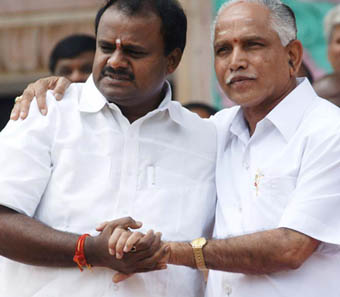Bengaluru, Jun 1: JD(S) state president H D Kumaraswamy has said that Congress is his “first enemy”, as it is making concerted efforts to dent the regional party's prospects.
 Speaking to reporters in Bengaluru on Tuesday, Kumaraswamy said that the Congress was trying to harm the prospects of the BJP in the Rajya Sabha and Legislative Council polls.
Speaking to reporters in Bengaluru on Tuesday, Kumaraswamy said that the Congress was trying to harm the prospects of the BJP in the Rajya Sabha and Legislative Council polls.
As both the JD(S) and BJP have fielded a second candidate in the Council elections, he said that he would hold talks with the saffron party leaders and decide on extending support. Both parties are short of numbers to get their second candidates elected.
He clarified that the upcoming elections were not a contest with Congress leader and Energy minister D K Shivakumar. “This is not a fight against D K Shivakumar. He is strategising to ensure that his party candidate wins and I am doing the same,” he added.




Comments
These so called politicians are well known for their corruption. They will support any party for chair. They're fooling public and earnings out of voters blood.. Shame on them..
Hope my dear SDPI brothers will learn a lesson from his Comments and will think Twice before joining hands with Janatha Dal like sdpi did in Mangalore earlier
Nothing new in this!! every one you are opportunist politician, you have only one agenda that s power hungry!! for that you are ready to do anyting
Sometimes with congress....sometimes BJP....sometimes with communist.....reckless people....no ethics and morale at all....
Please stop fooling innocent voters....Mr. Siddaramayya is doing a good job around there....
Add new comment